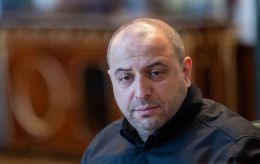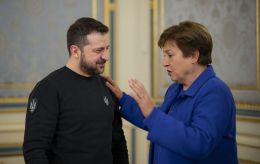Safer than Vegas: American Michael Villena shares what life's really like in Ukraine
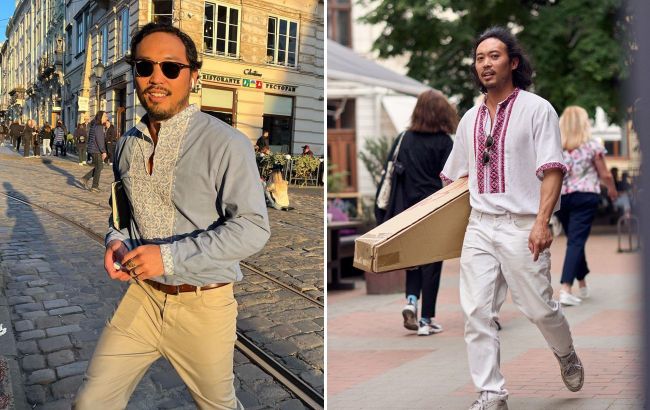 Michael Villena is from the USA, but he has been living in Ukraine for six years (collage: RBС-Ukraine)
Michael Villena is from the USA, but he has been living in Ukraine for six years (collage: RBС-Ukraine)
Why is life in Ukraine better than in the US, even during wartime? Which Ukrainian traditions pleasantly surprise and which ones irritate Americans? How are Ukrainians fundamentally different from Russians and residents of other Eastern European countries? What should foreigners know if they want to move to our country? American "Cossack" Michael Villena shared his thoughts on these and other topics with RBC-Ukraine.
Michael Villena is originally from Texas. There, he worked as a financier on famous Wall Street and always loved to travel. During one of his trips, he met a Ukrainian man who gave Michael his first hryvnias. The American came to Ukraine six years ago and, since then, he has realized that he wants to live here.
He is now married to a Ukrainian woman (they recently celebrated their wedding), works remotely as a financial analyst, paints, writes music in Ukrainian, and performs stand-up comedy in Lutsk.
In an interview with RBC-Ukraine, Michael spoke about why he decided to stay in Ukraine, what surprised him after moving here, how he is learning the Ukrainian language, which traditions he has adopted, what he loves, and what he still doesn't understand about daily life. He also shared his thoughts on the differences between the US and Ukraine and revealed why he dreams of building a family here.
Key questions:
- From Wall Street to Reitarska Street. How an American ended up in Ukraine during the pandemic and why he stayed?
- Why does Michael no longer want to live in the US?
- With love for Ukrainians. What surprises him about our people, mindset, and celebrations you won't find in the US?
- How does a foreigner deal with air raids, prepare for his wedding under fire, and make plans for his future in Ukraine?
- Skriabin and a love for Izdryk: What inspires him, which traditions he has embraced, and what he advises others thinking of moving to Ukraine?
– Tell us more about yourself. Where were you born, and what did you do before moving to Ukraine?
– I was born in Texas, studied finance there, and then worked in New York on Wall Street. I lived six years in Germany. Also in Vienna. So, I speak German. During the COVID pandemic, I was in Ukraine. And before that, I also lived here.
– How did you end up in Ukraine? Why did it come to your mind?
– I traveled a lot, visited almost 40 countries, but when I lived in Munich, I met a Ukrainian. He is from Lutsk, where I live now. He gave me my first hryvnias.
I didn't know that one hryvnia isn't much, but he said I needed to visit Ukraine. Not just Kyiv, but also Odesa, Lviv, the Carpathians, and other places. So, I arrived in Ukraine for the first time as a tourist in 2019. For the second time, I visited as a tourist too. But then the pandemic began, and I stayed for two years.
– Why did you decide to stay here?
– Six years ago, I worked more as an artist. I collaborated with a gallery in Vienna. I love Vienna, but it's more expensive and more competitive there. Here, I feel freer as an artist; I can create.
I lived on Reitarska Street. I didn't know that it was a very creative, hipster street. It was a coincidence. I really liked it, and I painted a lot. I found a lot of inspiration and decided to try living here and creating art.
– Tell us about your first impression when you first arrived in Ukraine.
– I was surprised that Ukraine is like many Western European countries. As an American, I didn't know much about Ukraine. Kyiv turned out to be very beautiful architecturally and even more modern than I expected.
I thought Ukraine was still a developing country. Kyiv is cheaper than Vienna, and, in my experience, cheaper countries are not so modern.
But here, there are beautiful cities, wonderful people, and I had very pleasant and positive impressions.
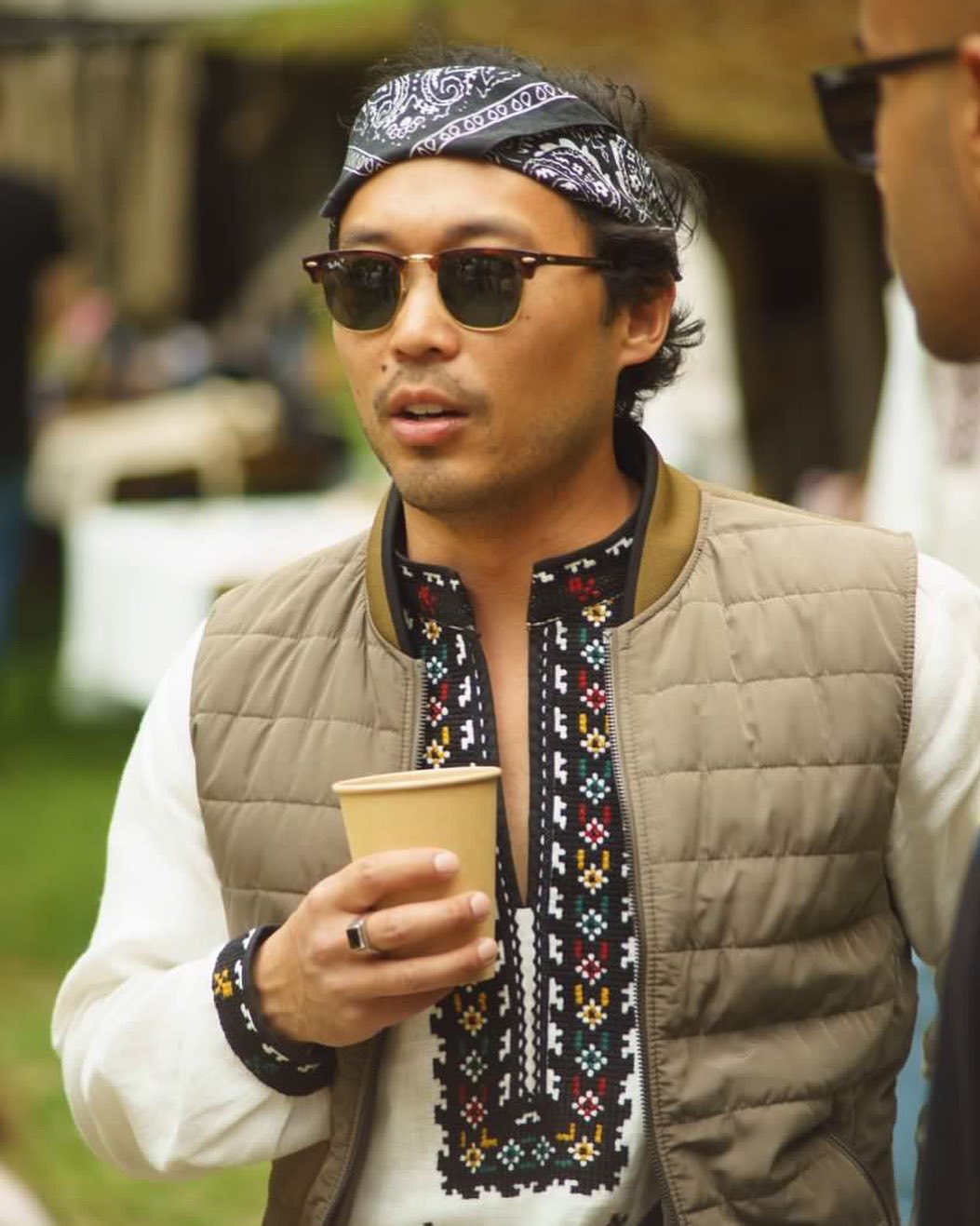 Michael Villena first came to Ukraine in 2019 (photo: instagram.com/ohmykhailo)
Michael Villena first came to Ukraine in 2019 (photo: instagram.com/ohmykhailo)
– Tell us how you imagined Ukraine before you moved here. You said you thought it was more of a developing country.
– I tried to avoid many stereotypes, but in 2018, I unfortunately was in Russia. I thought it would be the same experience. As an American, I didn't realize how big the difference between Ukraine and Russia would be.
I felt some similarities, but I noticed that it's a different country, a different language. However, six years ago, I heard more surzhyk (mixture of Ukrainian and Russian languages - ed.) or Russian than I do now.
Ukraine is a blend of European style and post-Soviet influence. This affects Ukraine more than the cultures of other countries.
– What impression did you have of Russia at the time, since you said you noticed the difference between Ukraine and Russia?
– The biggest difference is the people. I didn't have the same positive experience and emotions there as I do in Ukraine.
Before coming to Russia, I imagined St. Petersburg to be very beautiful architecturally. I had the same impression of Kyiv.
At that time, I didn't know much about history, and I still don't know much, but the main difference is in the mentality. It was very noticeable.
– You speak Ukrainian very well for a foreigner. How did you learn the language?
– In fact, I don't speak very well, but I started learning during the pandemic. My ex-girlfriend was from Mukachevo. We lived in Kyiv, and she started helping me with Ukrainian.
I collected predictions from Silpo supermarket (there are funny predictions on each receipt you get at the supermarket) and wrote songs. Even my first music album came out in Ukrainian five years ago. But it was difficult in 2020. Most of my friends spoke Russian.
Before the full-scale invasion, I decided to move to Lviv to improve my Ukrainian. I found a teacher who works at UCU. I finally started taking proper lessons. Not regularly, but I studied grammar, cases, which was very difficult.
Unfortunately, I don't practice much now, only through interviews or when performing, but at home, I speak English.
– What do you still find difficult about the Ukrainian language?
– The genitive case is always the hardest. Also, I have difficulties with stress. It's crazy that I can say "zAmok" ("castle") or "zamOk" ("lock") and they are different words.
I don't remember all the stresses, but grammatically, the genitive case is the hardest. I know that the most important thing is just to build sentences and thoughts, but I feel embarrassed when I speak incorrectly.
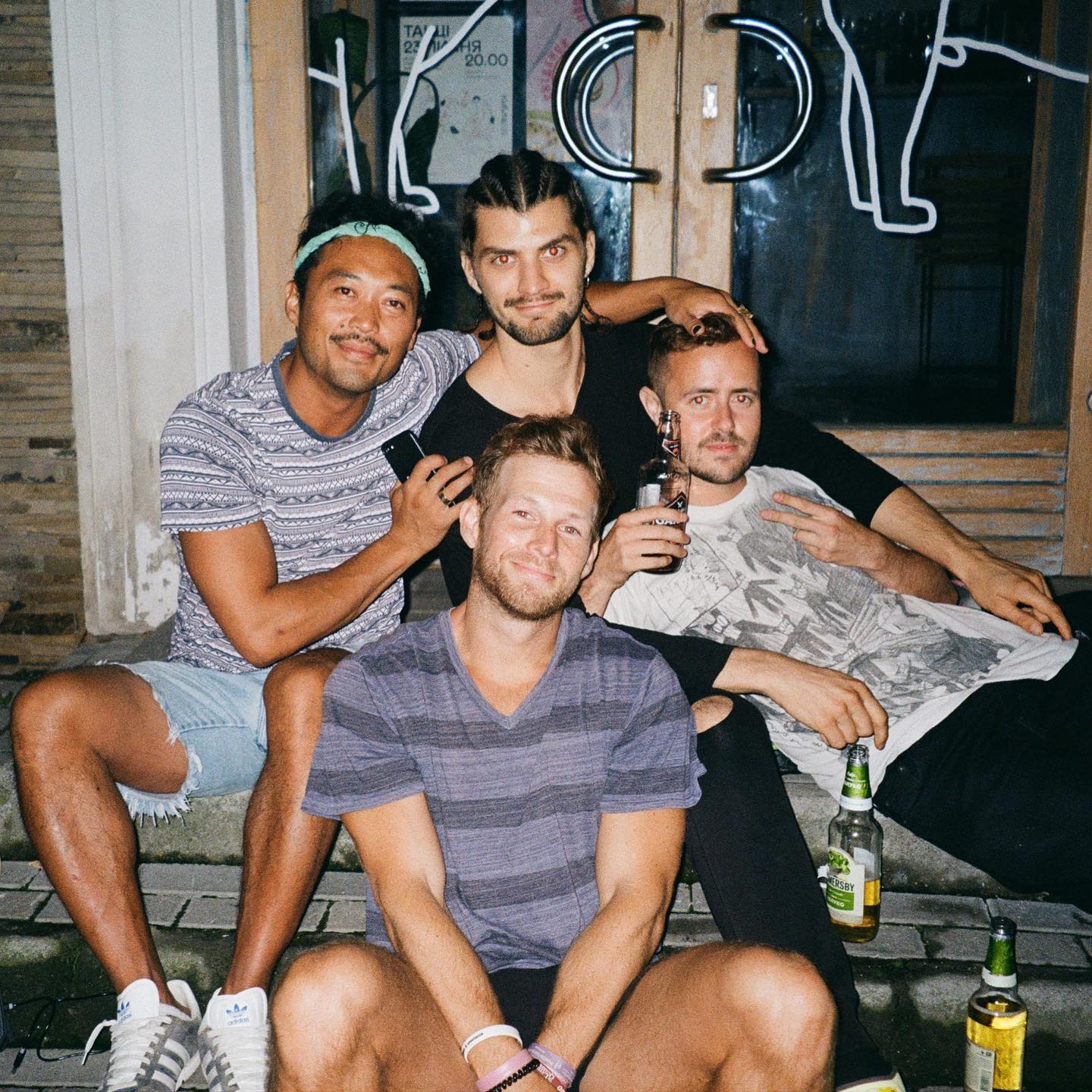 Michael Villena: The main difference between Ukraine and Russia is the people (photo: instagram.com/ohmykhailo)
Michael Villena: The main difference between Ukraine and Russia is the people (photo: instagram.com/ohmykhailo)
– Are there any words that you can't pronounce because of your nationality? Which words in Ukrainian are difficult for you?
– I think there are many. My wife said it's ok that I pronounce some words wrong.
I find all words with the soft sign and the letter combination "iia" difficult. For example, my wife's name is Yuliia, but I say Yulichka because it's easier for me.
I will always speak with an accent, but I also have problems with "i" or "y." I often make mistakes in words like that. I just don't hear the difference in words, and it's very hard.
But generally, I pronounce many words wrong. "Palianytsia," for example.
– I saw many photos of you in vyshyvanka embroidered shirts on your Instagram. How many do you have?
– Yes, I really love vyshyvanka. The first time I saw such a shirt was on Ukrainians in Vienna or Munich. I thought it was something cool and special.
I have a lot of embroidered shirts. If I like one, I immediately buy it. I think I have about nine embroidered shirts now. I can literally wear a new one every day. In my opinion, it's a very stylish element of culture. I ride my skateboard in embroidered shirts, and in general, I do many things wearing them.
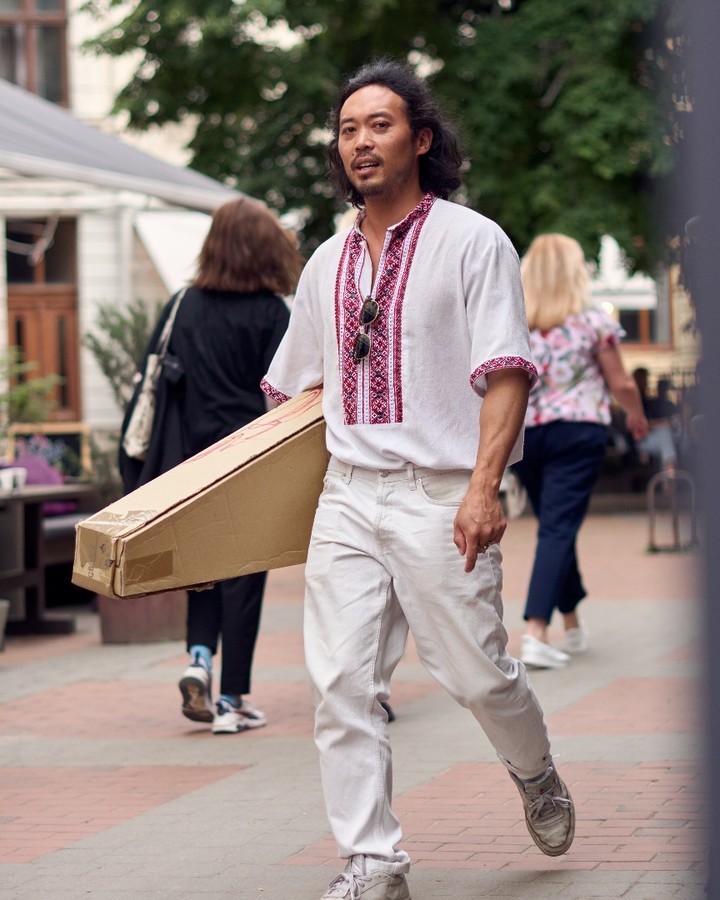
The American's wardrobe already includes nearly 10 vyshyvankas (photo: instagram.com/ohmykhailo)
– How do you like Ukrainian cuisine? Which dishes did you like immediately, and which ones do you still not understand?
– Good question. For example, when I moved to Ukraine, my weight was 72 kilograms, and now I weigh over 80. It's incredible. Most people put on weight in America, but I've gained weight in Ukraine. So yes, I love Ukrainian food.
My favorite is dumplings with potatoes, cheese, borscht, and holubtsi. I love them all with sour cream.
What I don't particularly like is kholodets (aspic). It's strange for me. And kholodnyk (cold soup). It's just weird, but the last time I ate it, I liked it. Maybe it depends on where I try it. Also, I don’t particularly like krovianka (blood sausage).
But I love salo. Recently, I tasted fresh meat. They slaughtered the pig right before my eyes. It was scary. I think I will eat less pork in the future, although it's very tasty.
Overall, I love Ukrainian food very much, more than food from other countries. When I see someone in Ukraine with a belly, I see satisfaction.
– Was there anything that shocked you when you first came to Ukraine?
– It wasn't exactly shocking, but for example, my first ride in a minibus. It was a new but cool experience.
Also, Ukrainian roads. In the morning, we were in Ternopil, and we drove to Lutsk. And it was a tough road, considering modern Ukraine. It wasn't very nice.
And also, the metro in Kyiv. It's cool, but I still remember the tokens you must throw into the machine to get through. It felt outdated. I think that's about it.
Overall, I think Ukraine is closer to Western European countries than others.
– What do you like about the Ukrainian way of life?
– Living now is especially strange because you can be in a cafe with friends, joking, while the lights are off. It's something about the Ukrainian mentality, a more positive one.
And what's interesting: in Ukraine, I move around more than in other countries. The public transport here is convenient; I can go anywhere or walk to the place.
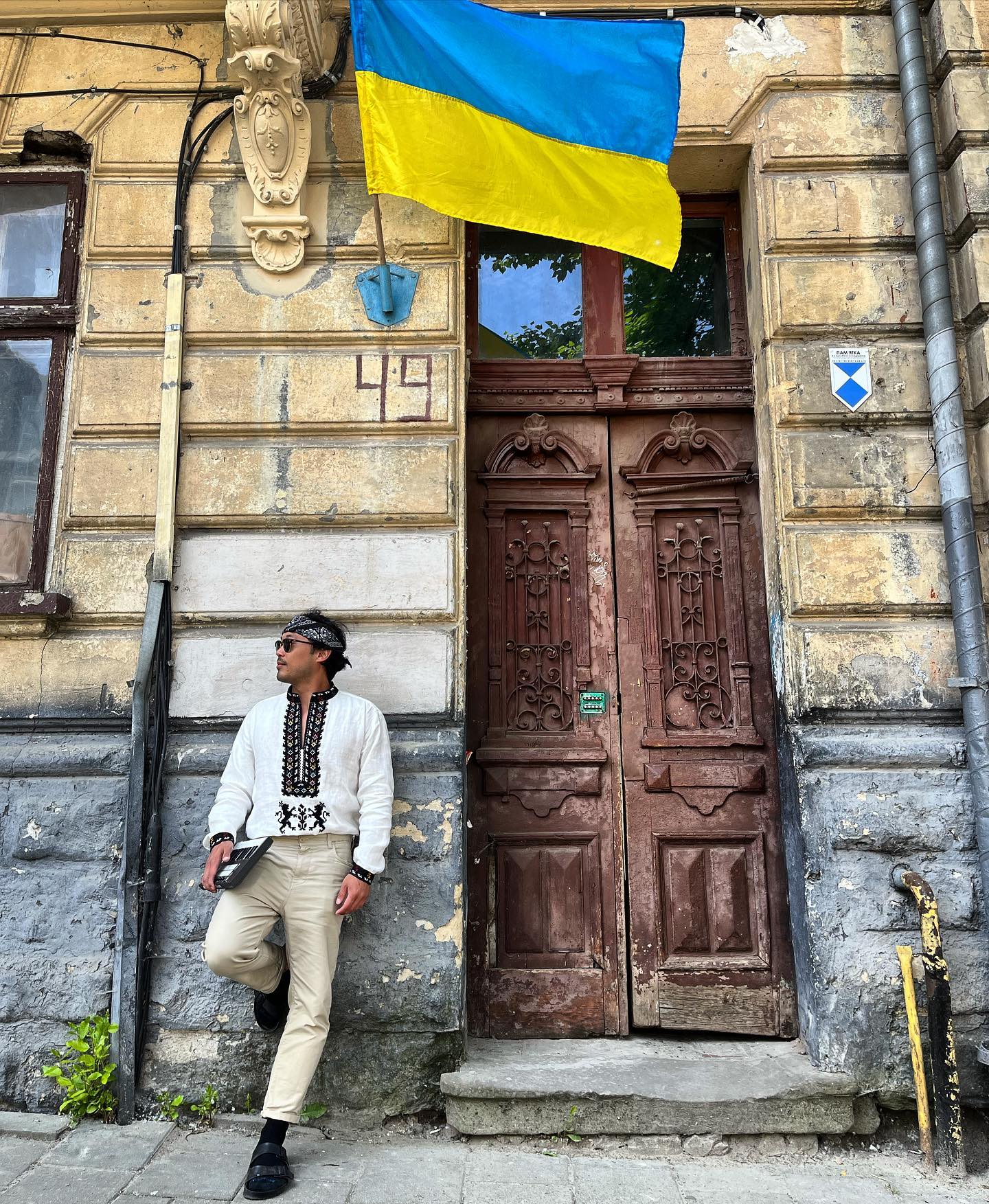 Michael believes that Ukrainians are quite a positive nation, as they manage to stay strong even through difficult times (photo: instagram.com/ohmykhailo)
Michael believes that Ukrainians are quite a positive nation, as they manage to stay strong even through difficult times (photo: instagram.com/ohmykhailo)
– How would you describe Ukrainians, considering that you're a foreigner and see us somewhat from the outside?
– I would describe Ukrainians as a very warm, sincere, pleasant, and intelligent nation. It depends on the person, not the nationality, but from my experience, most Ukrainians I've met are like that. Especially in Ternopil, where I was yesterday. It's my favorite city in Ukraine.
It also seems to me that Ukrainians are more open than Germans, for example. I don't know about other foreigners, but here I've made many friends. Not just people my age, I have friends who are as old as my grandparents. And I think it's because Ukrainians are very sincere, pleasant people.
– What everyday habits of Ukrainians seemed unclear or strange to you?
– Many superstitions. For example, not throwing away garbage after lunch. Why? For me, it's ridiculous. But I like the superstitions about money because it means I'll be rich.
Americans don't make concrete plans right away. We can say, "Yeah, see you next week," but we're not serious. But in Ukraine, those are more honest words. It's a good habit.
I also didn't take off my shoes in the apartment, but now it's normal for me.
– Have you participated in traditions related to Ukrainian holidays?
– Yes. Two years ago, I was in Lviv during Easter. It was really cool. Especially when people sang "haivky," if I'm not mistaken.
As I understood, different regions of Ukraine have different traditions for celebrating. Last Christmas, we were in the village of Kryvorivnia. It's a very old village, and the atmosphere was magical. People sang on the street, and it was a very cool experience for me.
Earlier, I was a camp counselor at a children's camp in the Carpathians, and we celebrated Ivana Kupala. We jumped over the fire, sent wreaths down the river. I really love new traditions, learning new traditions.
– When Russia began its invasion in 2022, were you in Ukraine or abroad?
– I was in Mexico. I clearly remember being surprised, but after two weeks, I came back to Ukraine. It was in March. I rented an apartment in Lviv and returned because I live here.
It was my choice, but it was a difficult decision. Most of my foreign friends left for other countries, but I came back.
– Weren't you afraid to go to a country at war?
– A little, yes, but I have many friends here, and I didn't think about my fear. I just thought that all my things are here, my life is here, I'll live here.
I remember it was tough. At first, air raids felt more serious to me. I always went to shelters. Now, I don't do that every time.
– When there are shellings, how do you feel? How do you react?
– It's always difficult, hard. I remember two weeks ago, my wife and I were rehearsing our first wedding dance in a room near the bathroom. We tried to stay safe, but we also thought about our future, and that our wedding would be the next day.
It was very strange. We don't live in fear, but these are very serious things.
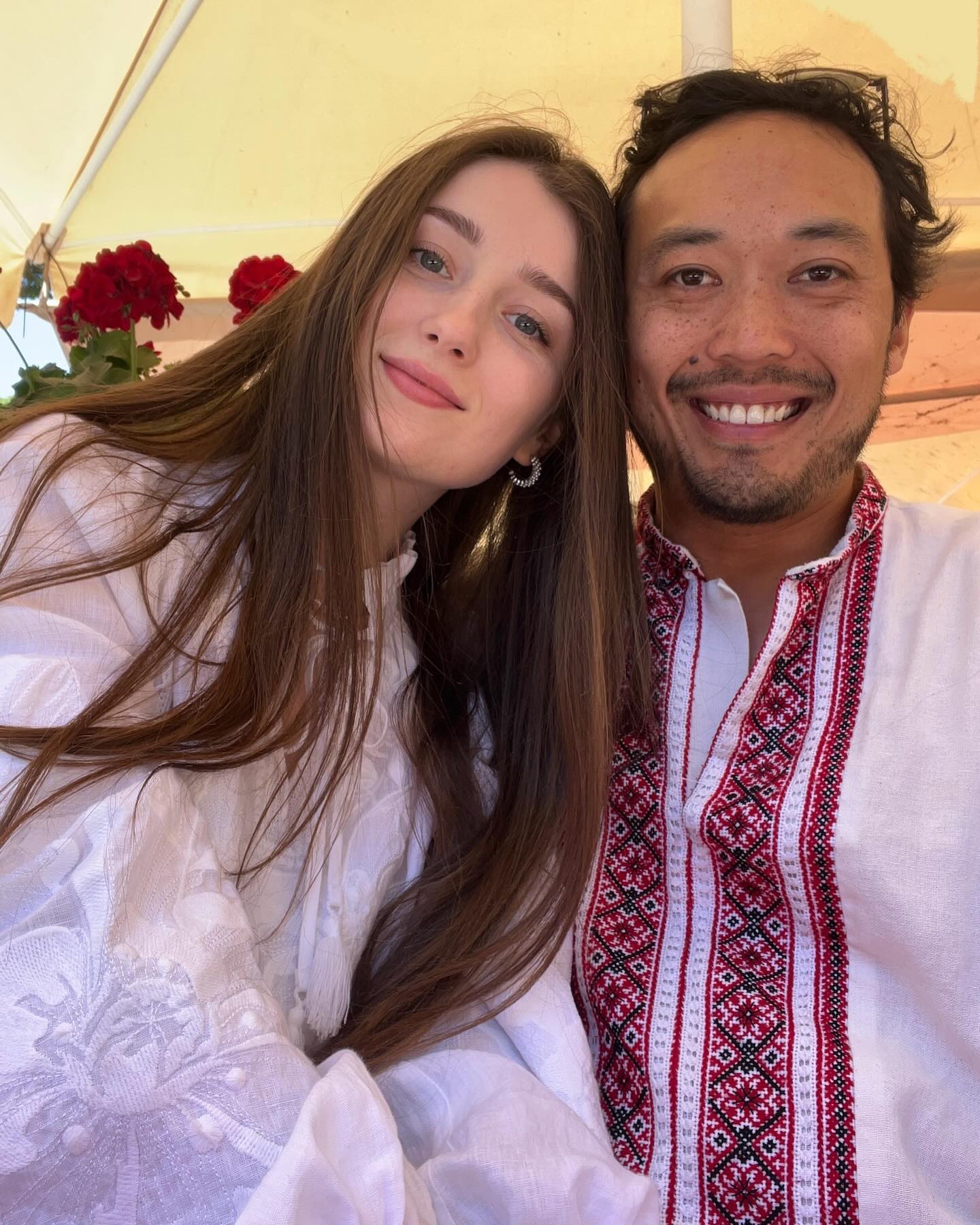 After the shelling of Lutsk, the next morning, Mykhailo and Yuliia's wedding took place (photo: instagram.com/ohmykhailo)
After the shelling of Lutsk, the next morning, Mykhailo and Yuliia's wedding took place (photo: instagram.com/ohmykhailo)
– Have you had moments when you wanted to leave Ukraine?
– Sometimes, yes. But only personal moments. I travel a lot and still want to. But I can't imagine life in other countries. We'll live here for a long time.
As an American, I really don't want to go back and live in America. It's not my place, and it's hard to live there. I love different countries, European countries. But I think everything I want, except for the war, I can find here, in Ukraine.
– You said that as an American, you don't want to live in America. What do you like more about Ukraine than the US?
– Besides traditions, culture, food, and people, it's also the safety every day. In Lutsk, I feel safer than in Las Vegas.
I think more people have died from shootings in Las Vegas than from the war in Lutsk. I understand that the Russians are terrorizing us, but in America, we terrorize ourselves.
For example, I feel that Ukrainians are more friendly towards me as a foreigner. There's more comfort here, more understanding. Maybe, it depends on the place I live and the people around me. But I really love living here and don't want to live in America.
– Is there something you miss from your American life?
– Honestly, just my parents, friends. And sometimes tacos that they sell there. Sometimes I miss the humor. In Ukraine, I perform as a stand-up comedian, but here, it's still developing. In the USA, it's already a very big sphere.
Also, I miss small talk, like in the USA. It seems to me that Ukrainians are open, but, for example, my wife doesn't like talking to strangers on the street. I understand why, but it's common in America.
– You mentioned earlier that you love Ukrainian culture. Name your favorite Ukrainian singer or band.
– I really love Skriabin. There are many reasons for this, but overall, because he's a very talented person. Also, Odyn v kanoe, Bumbox, Tember Blanche, BRYKULETS, Nazva. I also like TVORCHI. They're cool. These are the first ones I started listening to after moving here.
I have a podcast "Kraplia natkhennia," where we talk to different musicians or performers. That's how I met them.
– Name your favorite Ukrainian writer.
– I really love Yurii Izdryk. Recently, he was in Lutsk. I saw his performance. He's like a rock star (laughs). And it's really cool. Of course, Lesia Ukrainka, Lina Kostenko. We have many books at home.
I read a lot of his poetry, but it's difficult for me. I need my wife or Google Translate. So, I can't say I understand everything, but modern poems are easier for me.
– Have there been any funny situations due to language misunderstandings?
– Three years ago, we were at a Masliana celebration at Art-zavod. I wanted to order fish and potatoes, but when I opened my box, it was something very different. More like a salad.
But this wasn't the first time I ordered one thing and got something completely different.
Sometimes, when I talk to my mother-in-law, we have many misunderstandings. She says, "Take it and eat," and I say, "I'm full," but after that, there's more food on the plate. I don't know if it's a misunderstanding, but she makes me eat.
Also, when I ride the minibus, I still get shy and don't like shouting "at the stop, please," so sometimes I just ride to the last stop.
– Can you compare how expensive it is to live in Ukraine compared to America?
– It's much cheaper, especially in Lutsk, than in Kyiv. The last city I lived in America was New York, and it was incredibly expensive. For example, renting an apartment there costs over $5,000 a month. Now, we rent for $400.
In New York, there's a restaurant, Veselka, with classic Ukrainian dishes. I think varenyky there cost $15 or $20. In New York, it's normal, but here it's incredible. I can't eat that many varenyky for $20 in Ukraine.
So, I think New York is 10 times more expensive than Lutsk.
– How did you meet your wife?
– It's a modern love story. Through Instagram, she watched videos from Feel Ukraine. I was in Lutsk and filmed videos about different places. And I saw her Instagram and noticed she was from Volyn.
I wrote to her, and it was small talk. For three months, we communicated only online. Two years ago, we met in real life. Six months later, we started living together.
I didn't need to have a Ukrainian wife; it was a matter of chance. When I lived in Germany, my ex-girlfriend was German. When I lived in the USA, she was American.
It's not essential for me; it's more important to have something in common. My wife speaks English, German, and lived in Germany for a while. We have a lot in common, and it's cool.
I'm really glad I found a Ukrainian girl, especially from a village. It's very interesting: fresh meat, digging potatoes. Now, it's my duty forever (laughs). The first time I helped her family gather potatoes, I thought it would be a small, cozy garden. I didn't think I'd end up in slavery.
It's interesting. I think our couple is either a coincidence or fate.
 Mykhailo and his wife Yuliia (photo: instagram.com/ohmykhailo)
Mykhailo and his wife Yuliia (photo: instagram.com/ohmykhailo)
– Have you noticed any particular features in the way relationships are built in Ukraine or how gender roles are distributed?
– By the way, my wife was the first to step on the towel because she is our head of household. I just listen to what she wants. But yes, I am more democratic.
I work as a financier in an American company, so I earn my salary in US dollars. This means my wife doesn't need to work unless she wants to. But she helps with household chores and plans our leisure activities and trips. Yulia also helps with my Ukrainian projects.
However, in the future, I might want to change our gender roles. I would like her to work, and I would make dumplings. I think doing household chores is more difficult than working.
I work online, so it's easier for me. Most of all, I want to grow in cooking, care for my partner, and support her, because sometimes I feel selfish, as if I am just working and earning money.
But I understand that right now I work for an American company, and that makes sense. I like it. But in the future, yes, I would like to exchange roles. I think she would be for it, or maybe not. I still don't know.
– What other Ukrainian traditions were at your wedding?
– There were not many traditions at the wedding. My wife didn't want people to shout "bitter" (for a kiss). We didn't have the bride ransom. Washing my mother-in-law's feet is an interesting tradition. Unfortunately, we didn't do that at the wedding. But I suggested to my mother-in-law for the future, if she wants (laughs). We had a korovai (traditional bread) at the registration.
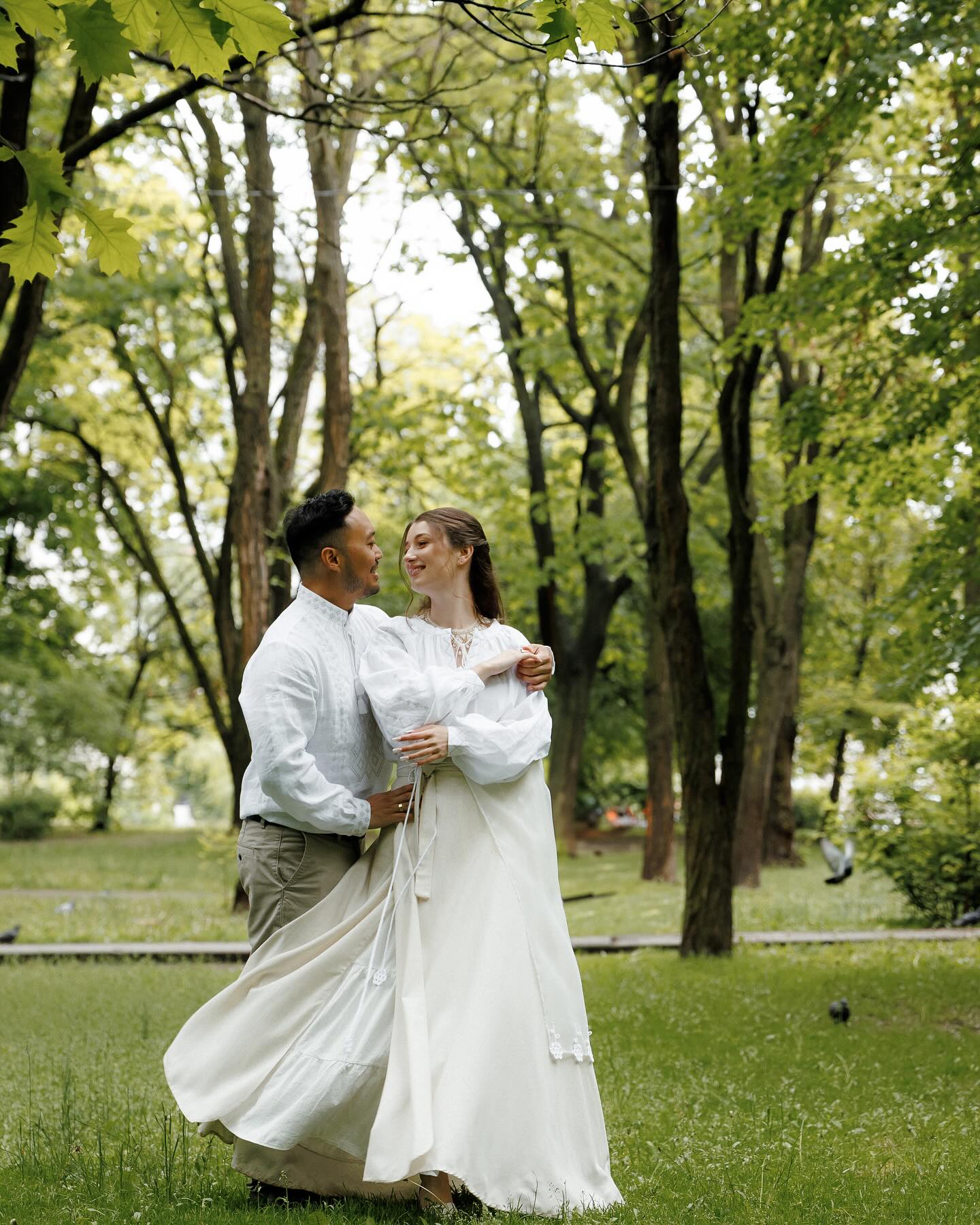 Recently, the couple got married, and their wedding was held in a half-Ukrainian, half-European style (photo: instagram.com/ohmykhailo).
Recently, the couple got married, and their wedding was held in a half-Ukrainian, half-European style (photo: instagram.com/ohmykhailo).
– How do you see your life in Ukraine in the future?
– It's always hard to say "forever" when there's a war. But I imagine a lovely picture at the table here in Ukraine, me, my wife, our children, and Google Translate, because I don't understand a single word.
Yes, I want to create a family here and live here for a very long time. Maybe one year abroad, or maybe in New York again, for example. I really want to, but just for one year. More like a long trip, but I think all of our lives will be in Ukraine.
– What advice would you give to foreigners who want to move to Ukraine?
– Quickly learn how to read and speak Ukrainian. I think it's a window to the culture. It's very important.
Helping during the war, of course, is important. Understanding how difficult it is for Ukrainians to live next to Russia. Learning about history, traditions, and culture helps. That's valuable, I think. I love living here. I already understand a lot about this culture, and I've found very good friends here.
Also, read the interview with RBC-Ukraine with historian and architect Yehor Kravets about what has been closed to tourists for decades in Kyiv's St. Michael's Cathedral, when the Golden Gates became a hangout spot, and why the Sikorsky house is not being restored.
